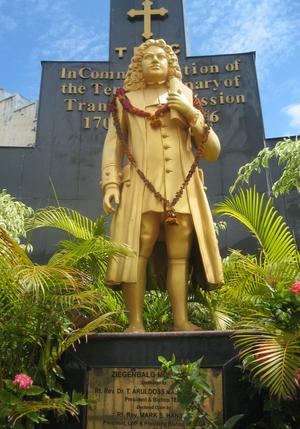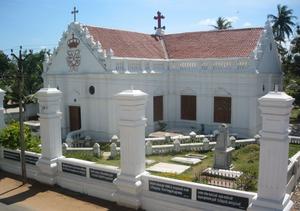Schools, Missionaries and Book Printing

In 1706, two missionaries Bartholomæus Ziegenbalg and Heinrich Plütschau arrived in Tranquebar. They founded the first organized missionary undertaking in the history of the Protestant Church. An effective school system was established along with a printing press that came to play a decisive role in the dissemination of printed Tamil literature.
However, their mission work among the local population of Indians was at first opposed by the Danish trading company whose civil servants had a policy of non-interference in the lives of the locals. Ziegenbalg was imprisoned for four months on the charge that by converting natives in Tranquebar, he was disturbing the prevailing peace among the local groups of castes as well as encouraging a rebellion.
The two missionaries had been sent by the Danish King Frederik IV and both were recruited from the pietistic Francke Foundations (Franckesche Stiftungen), in the German town Halle, and the Tranquebar Mission – or the Royal Danish Halle Mission as it was also called – became the first organized missionary undertaking in the history of the Protestant Church.
Upon arrival, the missionaries immediately began to learn Portuguese, which was the usual colloquial language among Europeans and Indians in the trading post, and to familiarize themselves with the local vernacular Tamil. Ziegenbalg in particularly had a gift for languages and to support the mission work, he drafted Tamil dictionaries and translations of Luther's Catechism and the New Testament. As part of this work a printing press was established in Tranquebar in 1712, which came to play a decisive role in the dissemination of printed Tamil literature.

Education was a central element in the pietistic strategy of the Tranquebar Mission to convert the local population to Christianity. Within a few decades, the mission established an effective school system in Tranquebar, which made it possible for a broad segment of the local youth to receive basic school education. Especially for children from the lowest ranking castes that previously had no access to any kind of schooling, the mission schools opened new perspectives and possibilities for social mobility. The educational success of the missionaries soon spread from the Tranquebar area to other parts of south India, where the missionaries established a number of schools.
Between 1706 and 1818, thirty-eight missionaries came to Tranquebar from Halle, with around eight to ten missionaries staying in Tranquebar at a time. After the Napoleonic wars (1803-1815), the Tranquebar Mission was weakened and debt-ridden and had lost the support of the Danish crown, and in 1825 the mission was in effect closed, due to lack of economic and political support from the Danish state.
When the Tranquebar Mission ended in the 1820s, the German Leipzig Mission took over the buildings and activities of the mission in Tranquebar until the Tamil Evangelical Lutheran Church (TELC) was founded in 1919. TELC today counts about 100.000 members in around 110 pastorates and is a direct descendant of the Tranquebar Mission and an important religious community in contemporary Tranquebar.
Text: Professor Esther Fihl and Research Assistant Caroline Lillelund, 2015
Web design and supervision: Assistant Curator Bente Gundestrup
Language editing: Research Assistant Manasa Bollempali
